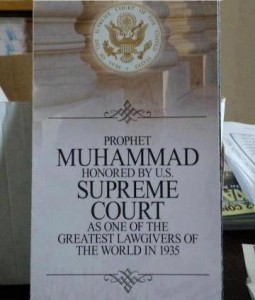في لافتة جميلة من “المحكمة الدستورية العليا .. US Supreme Court” للولايات المتحدة الأميركية اعلى سلطة قضائية هناك تشرفت الولايات المتحدة الأميركية بكتابة إهداء لسيد الخلق اجمعين النبي “محمد” عليه افضل الصلاة والسلام، حيث وضعت المحكمة في بوستر كبير في مداخلها و داخل مكتبتها صور الإهداء المكتوب عليه ” The United States Supreme Court honors Muhammad, the Prophet of Islam, as a source of law and justice”.
اي تتشرف المحكمة الدستورية العليا بالرسول محمد رسول الاسلام لكونه واحد من مصادر القانون و العدالة”.
و وضعته في قائمة “GREATEST LAW GIVER” of the World” اي قائمة مانحين القانون العظماء”.
و هذا الاهداء يرجع تاريخه الى سنة 1935 ميلاديا و هو مصور في بهو قاعةَ المحكمة بين مانحي القانونِ العظماءِ للبشرية”.
وتتحدث المحكمة الدستورية العليا الاميركية أن الرسول محمد نبي الاسلام هو من عظماء مصادر القانون و الذي اتى به جملة في منهجه المستمد من القرآن الكريم و السنة العظيمة حيث اتى به قبل ان تعرف البشرية معنى القانون و العدالة بعد الرسولين “موسى و سليمان” عليهم صلوات الله هم و الرسل اجمعين.
و أليكم نص ما قالته المحكمة باللغة الانجليزية عن هذا الاهداء و سببه
Muhammad (c. 570 – 632) The Prophet of Islam. He is depicted holding the Qur’an. The Qur’an provides the primary source of Islamic Law. Prophet Muhammad’s teachings explain and implement Qur’anic principles. The figure above is a well-intentioned attempt by the sculptor, Adolph Weinman, to honor Muhammad, and it bears no resemblance to Muhammad. Muslims generally have a strong aversion to sculptured or pictured representations of their Prophet.
In the year in which the frieze of Prophet Muhammad was erected, Franklin D. Roosevelt was president, and Charles Evans Hughes was the Chief Justice. It is not known how the court deliberated on this architectural contribution. No one at that time thought it inappropriate to include Prophet Muhammad as one of the greatest lawgivers of the world at the chambers of the United States Supreme Court. This was despite the fact that American society at that time was not as diverse as it is today. Women had just acquired the right to vote, and Japanese-Americans were about to be sent to concentration camps.
Prophet Muhammad’s Peace And Justice Movement
Prophet Muhammad envisioned a just and peaceful society. With a mass peace movement, he achieved this goal during his life. He hated war and always preferred a peace treaty with his opponents, even if it was not favorable to his and his followers’ interests. He established his first peace sanctuary in the city of Madinah without any war whatsoever. While he did fight to defend that peace sanctuary, it is critical to note that the total time of actual fighting defending his people was not more than six days in his life of 63 years. He struggled to secure a peace that ensured justice and liberation for all people, especially for those most marginalized and oppressed.
He taught that there is one God for all mankind.
He taught Muslims to believe in all of the prophets and all divinely revealed scriptures, especially Biblical ones.
As the Prophet established a peace sanctuary called Madinah after his migration from Makkah, he negotiated treaties with the Jews and the pagans of Madinah. Muslims consider these treaties to be the first written surviving constitution in the world. The constitution guaranteed freedom of religion, self-governance, and legal autonomy in all matters. It called for the common defense of Madinah, and declared the Jews, pagans, and Muslims of that treaty to be one nation, or “one Ummah.”
He prohibited hunting and the cutting of trees in the peace sanctuary of Madinah.
He declared killing non-combatants to be illegal, placed severe restrictions on how warfare could be conducted, and even paid compensation for the killing of some dogs by one of his commanders.
The Prophet’s teachings and the Quran are the two major sources of Sharia. Some of his precepts include the following:
Moral behavior: personal cleanliness; emphasis on preservation and nourishment of all life forms, including plants and animals; rituals and spirituality of prayers; fasting and charity; righteous conduct and good deeds; and rights of parents, children, spouses, and neighbors.
Interpersonal relations: teaching to enhance human relations and to avoid breaking relationships; encouraging mutual consultation in all affairs; prohibiting bigotry and racism; and emphasizing kindness and hospitality toward others, especially the weak and the poor.
Financial guidelines: encouraging charity, rights of the poor, respect for workers, and rejection of exploitation; and circulation of wealth among all classes.
Personal rules and laws regarding privacy, gender relations, marriage, divorce, and inheritance.
Criminal laws implementing the many of the Ten Commandments. (The only one of the Ten Commandments not having a parallel statement in the Quran is the one having to do with keeping the Sabbath.) Less than two percent of Quranic verses deal with the criminal law of Islam, which is a part of the Sharia but not the totality of it.
The Prophet asked his judges to make things easy for people, not difficult.
He declared all sins forgivable as long as a person asks God’s forgiveness and that of the one who has been wronged.
The Prophet gave special emphasis to honoring treaties, standing up for justice, and opposing oppression.
In conclusion, while Muslims will disagree with the artist’s method, they certainly can agree on the artist’s respect for Islam and its fundamental tenet, Justice.
Indeed, Allah orders justice and good conduct and giving to relatives and forbids immorality and bad conduct and oppression. He admonishes you that perhaps you will be reminded. (Quran 16:90)
Narrated Anas: Allah’s Messenger said, “Help your brother, whether he is an oppressor or he is an oppressed one.” People asked, “O Allah’s Messenger! It is all right to help him if he is oppressed, but how should we help him if he is an oppressor?” The Prophet said, “By preventing him from oppressing others.”
[Sahih Bukhari, Volume 3, Book 43, Number 624] كويت نيوز اخبار الكويت والعالم
كويت نيوز اخبار الكويت والعالم 
